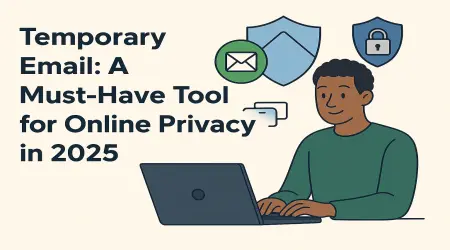

Facebook and Temp Mail: Convenience vs. Consequences
In the contemporary digital environment, where numerous online services require an email account, the adoption of temporary email services—commonly referred as “temp mail”—has gained considerable traction. These services can provide temporary, disposable and perishable email address, so individuals can register a web site in a short amount of time, and they accomplish this anonymously, and Facebook is one of the targeted websites accessed in this manner most often.
Temp mail provides users with a temporary, anonymous, and ultimately self-erasing email address. Such addresses cannot be active longer than a short period of time (only a few minutes or some hours), they are intended to avoid spam, to assure privacy and to allow one to register at Internet sites without revealing personal information such as one email address.
Big names in temporary email services are:
The Policy and Email Verification of Facebook
Under the registration activity of Facebook, it is mandatory that one uses a valid email address to validate his or her account, retrieve his or her password and use it to communicate. To this end, a large number of the users will go out of their way to create multiple or fake accounts using disposable email addresses with the hopes to evade this necessity.
Several reasons make Facebook oppose such practice:
Security Threats: Temporary email addresses are prone to any person with the address and thus data of the user is at risk.
Spam and Abuse Prevention: Facebook aims at reducing spam, fraudulent accounts and bot networks, all of which can be conducted via bulk registrations with temporary emails.
Confidence and Responsibility: The personal email has to be confirmed to be able to restore the account and support in case of issues.
Risks and Downsides
Despite the smart solutions of temporary email addresses, they are accompanied by the significant restriction:
1. Lack of Access: In the event of forgotten password or blocked account, no way can the user retrieve this apparently, except there is a dependable available primary mail address.
2. Let anyone use them: Many of the short-term mail inboxes are publicly accessible so that any person with the address can read incoming messages.
3. Facebook Policies: Creating a fake or unconfirmed account on Facebook is against its terms and conditions and this can attract permanent bans.
4. Reduced Reliability: The short-term mail can be distinguished by the algorithm of Facebook and be blocked in terms of functionality or visibility.
Ethically and practically, a temporary email may come in handy to people who value privacy above all- say when signing up to newsletters or other services that they intend to use but do not want to reveal their main mailing address. Nevertheless, the use of disposable email addresses can be considered as a possible ethical issue and can have a specific implication when it comes to the exploitation of social networks or abuse of their services (such as Facebook).
To sum up
temporary email gives a response quickly to the issue of online privacy, however, its application on websites like Facebook brings a mottled gain. Depending on the context, it will result in direct benefits at the expense of account security, violating platform regulations, and even worse effects. It is thus recommended to users that they should carefully consider the pros and cons of the situation and where they are at a crossroad, to choose credible and safe email services to have their long-term accounts like Facebook.










